| 16 March |
• yesterday • tomorrow |
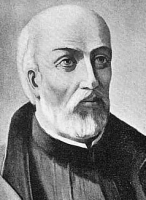
Jean
19 October as one of the Martyrs of North America
French Jesuit. He wanted to enter the priesthood from an early age, but his health was so bad there were doubts he could make it. His posting as a missionary to frontier Canada at age 32, however, was a literal god-send. He spent the rest of his life there, and the harsh and hearty climate so agreed with him that the Natives, surprised at his endurance, called him Echon, which meant load bearer, and his massive size made them think twice about sharing a canoe with him for fear it would sink. Brebeuf had great difficulty learning the Huron language. "You may have been a famous professor or theologian in France," he wrote in a letter home, "but here you will merely be a student, and with what teachers! The Huron language will be your Aristla crosse." However, he eventually wrote a catechism in Huron, and a French-Huron dictionary for use by other missionaries.
According to histories of the game, it was John de Brebeuf who named the present day version of the Indian game lacrosse because the stick used reminded him of a bishop's crosier (la crosse).
Saint John was martyred in 1649, tortured to death by the Iroquois. By 1650 the Huron nation was exterminated, and the laboriously built mission was abandoned. But it proved to be "one of the triumphant failures that are commonplace in the Church's history." These martyrdoms created a wave of vocations and missionary fervor in France, and it gave new heart to the missionaries in New France.
1593 at Normandy, France
tortured to death in 1649
29 June 1930 by Pope Pius XI
Canada
Brebeuf's Instructions to the Missionaries: In 1637, Father Brebeuf drew up a list of instructions for Jesuit missionaries destined to work among the Huron. They reflect his own experience, and a genuine sensitivity toward the native people.
• You must love these Hurons, ransomed by the blood of the Son of God, as brothers.
• You must never keep the Indians waiting at the time of embarking.
• Carry a tinder-box or a piece of burning-glass, or both, to make fire for them during the day for smoking, and in the evening when it is necessary to camp; these little services win their hearts.
• Try to eat the little food they offer you, and eat all you can, for you may not eat again for hours.
• Eat as soon as day breaks, for Indians when on the road, eat only at the rising and the setting of the sun.
• Be prompt in embarking and disembarking and do not carry any water or sand into the canoe.
• Be the least troublesome to the Indians.
• Do not ask many questions; silence is golden.
• Bear with their imperfections, and you must try always to appear cheerful.
• Carry with you a half-gross of awls, two or three dozen little folding knives, and some plain and fancy beads with which to buy fish or other commodities from the nations you meet, in order to feast your Indian companions, and be sure to tell them from the outset that here is something with which to buy fish.
• Always carry something during the portages.
• Do not be ceremonious with the Indians.
• Do not begin to paddle unless you intend always to paddle.
• The Indians will keep later that opinion of you which they have formed during the trip.
• Always show any other Indians you meet on the way a cheerful face and show that you readily accept the fatigues of the journey.
https://catholicsaints.info/saint-john-de-brebeuf/
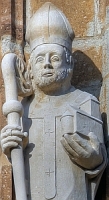
Eriberto, Herbert, Bert, Berti, Berto, Heri, Herko
Son of Duke Hugo of Worms, Germany. Educated at the cathedral school at Worms. Provost of the cathedral. Ordained in 994. Chancellor for Italy under King Otto III in 994. Chancellor for Germany in 997. Archbishop of Cologne, Germany on 9 July 999. Attended the death-bed of King Otto at Paterno. Initially opposed the ascension of King Henry II, and was imprisoned by him. However, when Henry was elected king on 7 June 1002, Heribert immediately acknowledged him as king, and became one of his advisors. Founded and endowed the Benedictine monastery and church of Deutz, Germany. Obtained miracles by prayer, including the end of a drought. Honoured as a saint even during his lifetime.
c.970 at Worms, Germany
• 16 March 1021 at Cologne, Germany of natural causes
• relics in the church at Deutz, Germany (part of modern Cologne
1075 by Pope Saint Gregory VII
• against drought
• for rain
• Deutz, Germany
• archbishop calling down rain by his prayers
• man kneeling before Saint Henry II
https://catholicsaints.info/saint-heribert-of-cologne/
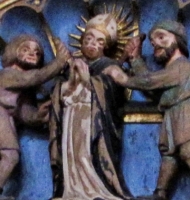
• John Cacciafronte
• Giovanni de Surdis Cacciafronte
• John de Surdis
Benedictine monk at the abbey of Saint Lawrence in Cremona, Italy. Abbot in 1155. Sided with the Pope against Emperor Frederick Barbarossa, and so was banished from the abbey by the emperor. Hermit near Mantua, Italy.
Bishop of Mantua in 1174, replacing a bishop removed for transgressions in office. In 1177, his predecessor repented, returned, and requested the return of his see. John asked permission to resign, return the mitre to the previous bishop, and return to his life as a hermit. The request was granted, and John transferred to Vicenza, Italy.
John was murdered by a man who had embezzled Church funds, and whom John was reprimanding. As John died working for the Church, and correcting a sinner, he is considered a martyr.
c.1125 at Cremona, Italy as John Sordi
murdered on 16 March 1183 at Vicenza, Italy
30 March 1824 by Pope Leo XII
https://catholicsaints.info/blessed-john-sordi/
• Eusebia of Hamay
• Eusebia of Hamaye
• Eusebia of Hamay-sur-la-Scarpe
Eldest daughter of Saint Adalbald of Ostrevant and Saint Rictrudis of Marchiennes; great-granddaughter of Saint Gertrude the Elder; sister of Saint Maurontius, Saint Clotsindis, and Saint Adalsindis of Hamay. After her father's murder when she was very young, she was sent to the abbey of Hamage, Doudi, France, which her great-grandmother had founded and served as abbess. Gertrude died when Eusebia was twelve years old; the young girl was elected to replace her. Rictrudis, realizing her daughter had no hope of governing the abbey, but wanting to keep it under the protection of a noble house, merged Hamage with her own house of Marchiennes, and ordered all the sisters to move in together under her rule. Many of the uprooted sisters, including Eusebia, were unhappy with this order as it kept them from obeying Saint Gertrude's last request. After much time and debate, the dissident sisters were permitted to return to their old house, taking Gertrude's relics with them, and taking Eusebia as their abbess. The delay had allowed her to grow into the position, and she proved an excellent abbess.
c.640
• c.680 of natural causes
• buried at her abbey church
https://catholicsaints.info/saint-eusebia-of-hamage/
Damiano
11 September (San Valentino in Abruzzo Cieriore, Italy)
Born to the imperial Roman nobility, Damian was raised a Christian and was known for his piety from his youth. When his father died, Damian became the ward of his bishop, Saint Valentino who, recognizing the young man’s piety, ordained him a deacon, and encouraged him to study for the priesthood. Damian travelled with Saint Valentino to evangelize the area of modern San Valentino in Abruzzo Citeriore, Italy, helped to convert people and build churches there, and was murdered by pagan priests fighting the new religion. Martyr.
early 4th century in Terracina, Italy
• beheaded in the forest near modern San Valentino in Abruzzo Cieriore, Italy in the 4th century
• buried at the site of his execution by local Christians
• relics re-discovered and enshrined in the oratory in Castel di Pietra c.1075; they become the site of miracles
• relics later re-enshrined in the cathedral of Saints Valentino and Damiano in San Valentino in Abruzzo Cieriore
https://catholicsaints.info/saint-damian-of-terracina/
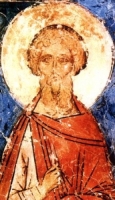
• Julian of Antioch
• Julian of Tarsus
• Julian of Cilicia
• Giuliano...
• 21 June (Orthodox calendar)
• 18 April (Armenian calendar
Prominent citizen of senatorial rank. Arrested for his faith during the persecutions of Diocletian, he was tortured then put on display for abuse for a year in cities all over Cilicia, being led around behind a camel. Martyr. Praised by Saint John Chrysostom in a homily during the enshrinement of his relics.
Anazarbus, Cilicia (in modern Turkey)
• sewn into a sack full of vipers and scorpions, and thrown into the sea to drown c.302
• relics enshrined in Antioch
• man being thrown into the sea in a sack
• man in a coffin which is floating into shore and on which sits four angels
• man bound on a camel being led through the streets
https://catholicsaints.info/saint-julian-of-anazarbus/
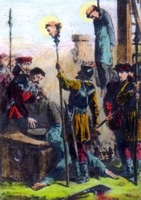
John Anne
29 October as one of the Martyrs of Douai
Married layman cloth merchant in Wakefield, England. Father of several children. A widower, he divided his property among his children, and studied for the priesthood in Rheims, France. Ordained in 1581. He returned to England as a home missioner to covert Catholics. Arrested at the home of a Mr Murton in Lancashire for the crime of priesthood. Martyred with Blessed Robert Dalby.
at Wakefield, West Riding, England
hanged, drawn, and quartered on 16 March 1589 at York, England
15 December 1929 by Pope Pius XI
https://catholicsaints.info/blessed-john-amias/
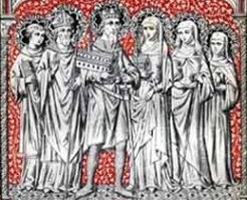
• Dentlin of Mons
• Dentelin, Denain, Dentelino
Son of Saint Vincent Madelgarus and Saint Waldetrudis; brother of Saint Landric, Saint Madalbarta and Saint Aldetrudis. Nephew of Saint Aldegund. An extraordinarily pious child, he is considered a confessor of the faith. A church in Cleves, Germany, was named for him.
• at age 7 in 7th century of natural causes
• buried in Soignies, Belgium
• relics transferred to the abbey church in Rees, Germany in the 1040's
• miracles reported at his tomb
Rees, Germany
https://catholicsaints.info/saint-dentlin-of-soignies/
• Finian Lobur
• Finian the Leper
• Finnian, Fintan
Disciple of Saint Columba. Founded a church and monastery at Innisfallen, Ireland. Monk at Clonmore, Ireland. Abbot of Swords abbey near Dublin, Ireland. In his later years he retired to Clonmore to spend his last days as a prayerful monk. He was called Lobhar (the Leper) because he briefly contracted leprosy when he miraculously cured a young boy of the disease.
at Bregia, Leinster, Ireland
c.560 at Clonmore, Ireland of natural causes
https://catholicsaints.info/saint-finian-lobhar/

29 October as one of the Martyrs of Douai
Protestant minister. Convert to Catholicism. Studied in Douai and Rheims in France. Ordained in 1588, he returned to England to minister to covert Catholics. Arrested for the crime of priesthood in 1589, he was martyred with Blessed John Amias.
at Hemingborough, Yorkshire, England
hanged, drawn, and quartered on 16 March 1589 at York, England
15 December 1929 by Pope Pius XI
https://catholicsaints.info/blessed-robert-dalby/
Allone
Monk of the Bobbio Abbey. His burial next to Saint Columbanus is evidence of his holiness, but all details of his life have been lost.
• 31 August during an unspecified year in the 7th century Bobbio, Italy of natural causes
• interred next to Saint Colombanus in the church at the abbey of Saint Colombano, Bobbio, Provincia di Piacenza, Emilia-Romagna, Italy
• relics enshrined in a wooden urn in 1482 in the crypt of the basilica of Saint Colombano built over the site of the old church
• altar, crypt and shrine were refurbished and the re-opened to the public in 1910
https://catholicsaints.info/saint-allo-of-bobbio/
• Abban of Magheranoidhe
• Abban of Murneave
• Abban of Murnevin
• Abbán moccu Corbmaic
• Abbanus, Eibbán, Moabba
13 May (Orthodox calendar)
Contemporary of Saint Patrick. Founded Kill-Abban abbey in Leinster, Ireland, and served as its first abbot. Founded the convent for Saint Gobnait of Ballyvourney, Ireland.
Irish
5th century Ireland of natural causes
• Cell Abbáin, Ireland
• Killabban, Ireland
• Mag Arnaide, Ireland
https://catholicsaints.info/saint-abban-of-kill-abban/
1 February as one of the 109 Spanish Claretian Martyrs
Member of the Claretians, making his profession on 8 December 1889. Ordained a priest on 3 April 1897. Martyred in the Spanish Civil War.
8 December 1873 in La Secuita, Tarragona, Spain
16 March 1937 in Montcada, Barcelona, Spain
• 21 October 2017 by Pope Francis
• beatification celebrated at the Basilica of Sagrada Familia, Barcelona, Spain, presided by Archbishop Angelo Amato
https://catholicsaints.info/blessed-joan-torrents-figueras/
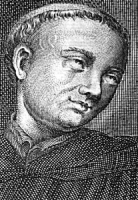
• Megingaud of Wérzburg
• Megingoz, Mengold, Megingaudus
Benedictine monk at the monastery of Fritzlar, Germany, in 738. Teacher at the abbey school. Abbot at Fritzlar. Bishop of Würzburg, Germany in February 754. In 769 he retired to Neustadt abbey to spend his last days as a prayerful monk.
710 in Franconia
783 at the abbey of Neustadt, Germany of natural causes
https://catholicsaints.info/saint-megingaud-of-wurzburg/
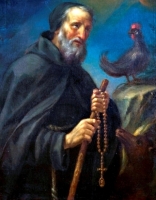
After a wild and misspent youth, Torello lived 60 years as a Vallombrosan oblate hermit in a walled-up cave.
1201 or 1202 at Poppi, Tuscany, Italy
between 1281 and 1292 at Poppi, Tuscany, Italy of natural causes
by Pope Benedict XIV (cultus confirmed)
Poppi, Italy
https://catholicsaints.info/blessed-torello-of-poppi/
Elaro, Ellaro, Hilarius, Ilario
Bishop of Aquileia, Italy. His prayers would cause the collapse of pagan temples and idols. Martyred in the persecutions of Numerian by order of the prefect Beronius.
tortured to death on 16 March c.284
Gorizia, Italy
https://catholicsaints.info/saint-hilary-of-aquileia/
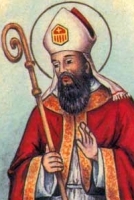
Mercedarian friar. Priest. Bishop of Lugo, Spain. Royal chaplain to the court of Castile.
• Saint Catherine monastery, Toledo, Spain
• body found incorrupt after 300 years
https://catholicsaints.info/blessed-ferdinand-valdes/
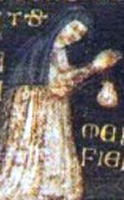
Poor Clare nun. Succeeded Saint Clare of Assisi as abbess of Saint Damian's abbey at Assisi, Italy.
1260 of natural causes
https://catholicsaints.info/saint-benedicta-of-assisi/
• Gregor Makar
• Gregory of Nicopolis
Armenian monk. Bishop of Nicopolis, Armenia. Became a hermit at Pithiviers, Orleans, France.
Armenia
c.1000 in Pithiviers, France
https://catholicsaints.info/saint-gregory-makar/>
Taziano
Deacon in Aquileia, Italy. Martyred in the persecutions of Numerian.
beheaded c.284
Gorizia, Italy
https://catholicsaints.info/saint-tatian-of-aquileia/
The details of this person's life have been lost.
relics enshrined in a Marian chapel in the Saint Alban cathedral in Bois-Vlilliers, Namur, Belgium
https://catholicsaints.info/blessed-eriberto-of-namur/
Denis
Layman in Aquileia, Italy. Martyred in the persecutions of Emperor Numerian.
beheaded c.284
https://catholicsaints.info/saint-dionysius-of-aquileia/
• Papa of Lycaonia
• Papas
Martyr.
Lycaonia, Asia Minor
Seleucia, Persia
https://catholicsaints.info/saint-papa-of-seleucia/
Christian lay man in Aquileia, Italy. Martyred in the persecutions of Numerian.
beheaded c.284
https://catholicsaints.info/saint-largus-of-aquileia/
Layman in Aquileia, Italy. Martyred in the persecutions of Numerian.
beheaded c.284
https://catholicsaints.info/saint-felix-of-aquileia/
Agapetus, Agapito
Fourth century bishop of Ravenna, Italy.
https://catholicsaints.info/saint-agapitus-of-ravenna/
Benedictine nun. Anchoress at Asti, Italy.
c.1090 of natural causes
https://catholicsaints.info/saint-malcoldia-of-asti/
Hermit and miracle worker in Syria.
https://catholicsaints.info/saint-aninus-of-syria/
CatholicSaints.Info Portable Edition